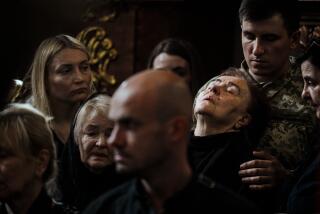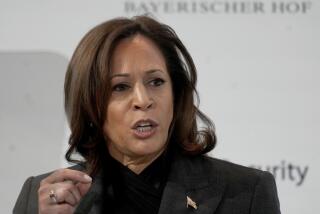No Amnesty for Perpetrators of Balkans Atrocities, U.S. Says : Warfare: Envoy comments after visiting a mass grave. She vows continued support for war crimes tribunal.
- Share via
ZAGREB, Croatia — U.N. Ambassador Madeleine Albright vowed Thursday after inspecting a mass grave in Serbian-occupied Croatia that the United States will never allow amnesty for those who have committed atrocities in the former Yugoslav federation, even as the price for a Balkan peace settlement.
The U.S. government also pledged $25 million in new support for a war crimes tribunal intended to try those suspected of crimes against humanity in this region still torn by nationalist war.
The contribution is likely to breathe some life into the 11-judge panel based in The Hague that was proclaimed by the U.N. Security Council last year but was granted few resources and little authority to pursue suspects.
Albright’s visit to the mass grave at Ovcara, a stretch of desolate, refuse-strewn farmland where at least 200 Croatian hospital patients are believed to have been executed and buried two years ago, was intended to underscore U.S. commitment to the international quest for justice in the Balkans.
“Seeing it there was a stark reminder of the horrors of this war,” said Albright, the highest-ranking U.S. official to visit any part of the former Yugoslav federation since hostilities broke out more than 2 1/2 years ago. “The fact that people suffer and then end up in something that is basically a garbage dump is symbolic of the tragedies of this country and other parts of former Yugoslavia.”
While Albright’s push for pursuit of war criminals demonstrated U.S. concern on humanitarian issues, it came at a time when European leaders are threatening a pullout from U.N. peacekeeping efforts and demanding more direct American military involvement to end the conflict.
Her presence here has served to spotlight Washington’s biggest foreign policy crisis and its ongoing dispute with NATO allies just as President Clinton embarks on his first European tour.
Albright, declaring the prosecution of war crimes “an integral part of the peace process” and vital to fostering any postwar recovery, said the United States will never allow the tribunal to be negotiated out of existence, as proposed by Serbs at Geneva peace talks.
To emphasize Washington’s commitment to the tribunal, John Shattuck, the assistant secretary of state for human rights, announced that the U.S. government is making another $25 million in professional services available to the court.
The contribution will ensure that the tribunal “gets off to a strong start,” Shattuck said, calling on other countries to ante up similar support for the first such panel since the Nuremberg court that prosecuted Nazi war criminals after World War II.
The United States and its West European allies have sharp differences in their policies toward the former Yugoslav federation, with the Clinton Administration still smarting over British and French refusal to back Washington’s proposals for stopping the war still raging in Bosnia-Herzegovina.
Clinton last spring called for air strikes against Serbian gunners besieging the Bosnian capital of Sarajevo and for a lifting of the U.N. arms embargo that has prevented only the forces of the Muslim-led government from acquiring weapons to defend the country.
Since West European allies nixed the U.S. “lift and strike” proposal, Britain, France, Canada and Spain have threatened to pull their troops out of Bosnia because they are increasingly endangered by the raging conflict they have no mandate to stop. The 12,000 U.N. troops deployed in Bosnia are assigned only to escort humanitarian aid.
French Defense Minister Francois Leotard stepped up the pressure on Washington earlier this week by announcing that he will appeal at the forthcoming North Atlantic Treaty Organization summit for deployment of U.S. military forces to Bosnia to back up existing U.N. forces.
The United States has refused to commit ground troops to the Bosnian conflict unless all three warring factions endorse a peace plan.
*
Albright, asked how the U.S. government will respond to calls for more direct involvement, insisted it is already demonstrating sufficient commitment, especially on humanitarian issues.
“We are the ones, as you can tell, that are pushing very hard on the war crimes tribunal, and we are also holding steadfast on the sanctions, so the United States is very much involved in this situation,” she said, sidestepping any mention of contributing troops.
The American ambassador to Croatia, Peter Galbraith, accompanied Albright and Shattuck to the Serbian-occupied territory and was the one who conducted the discussions with rebel authorities--to avoid, as one U.S. official explained, meeting with the renegades at “too high a level.”
The self-styled president of the Serbian-occupied region known as the Krajina, Goran Hadzic, conceded during the talks that Serbs have committed war crimes and even offered to turn over some unspecified suspects for prosecution, Galbraith said. But in light of previous pledges of assistance from the rebels in Western attempts to resolve the Balkan crisis, the U.S. officials seemed to hold out little expectation of cooperation.
More than a year ago, American forensics specialist Clyde Snow examined some remains at the Ovcara site, and his preliminary conclusions prompted a U.N. war crimes investigative team to order a thorough probe of the grave’s contents.
But Serbian nationalist gunmen who have occupied one-third of Croatia, including the area around Ovcara, near Vukovar on the eastern border, threatened the U.N. exhumation team at gunpoint and have blocked further probes.
More to Read
Sign up for Essential California
The most important California stories and recommendations in your inbox every morning.
You may occasionally receive promotional content from the Los Angeles Times.














